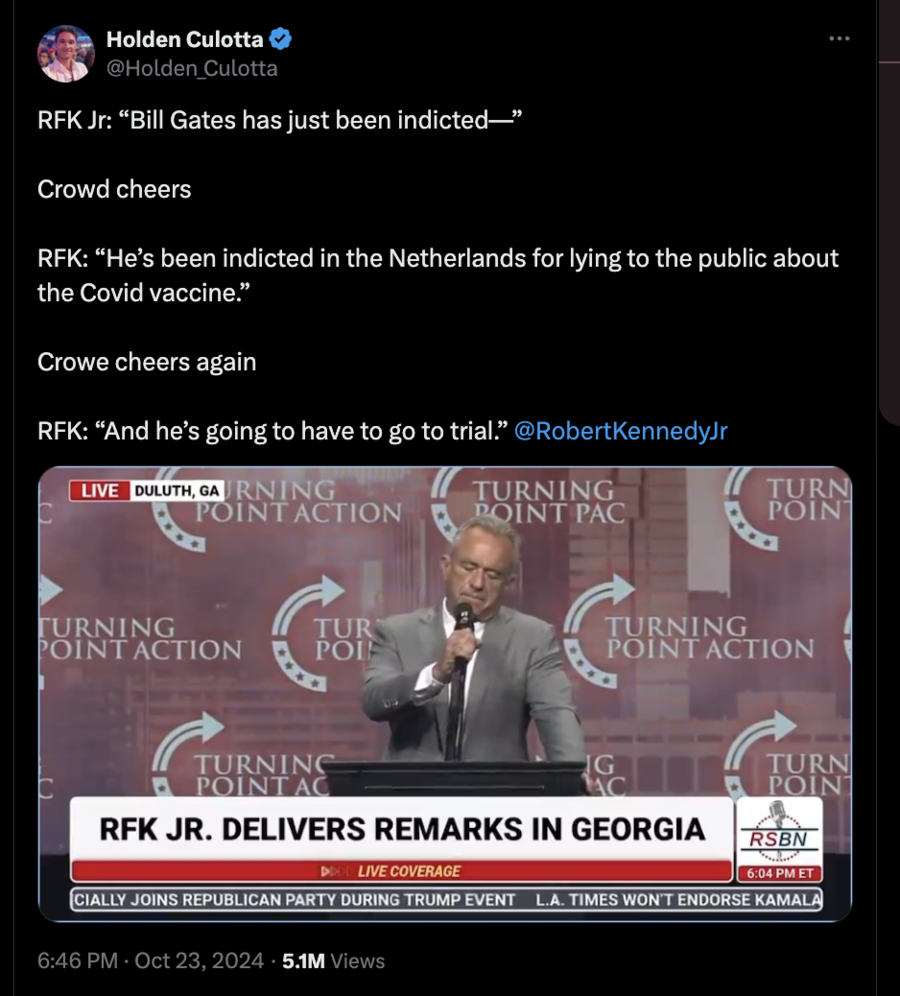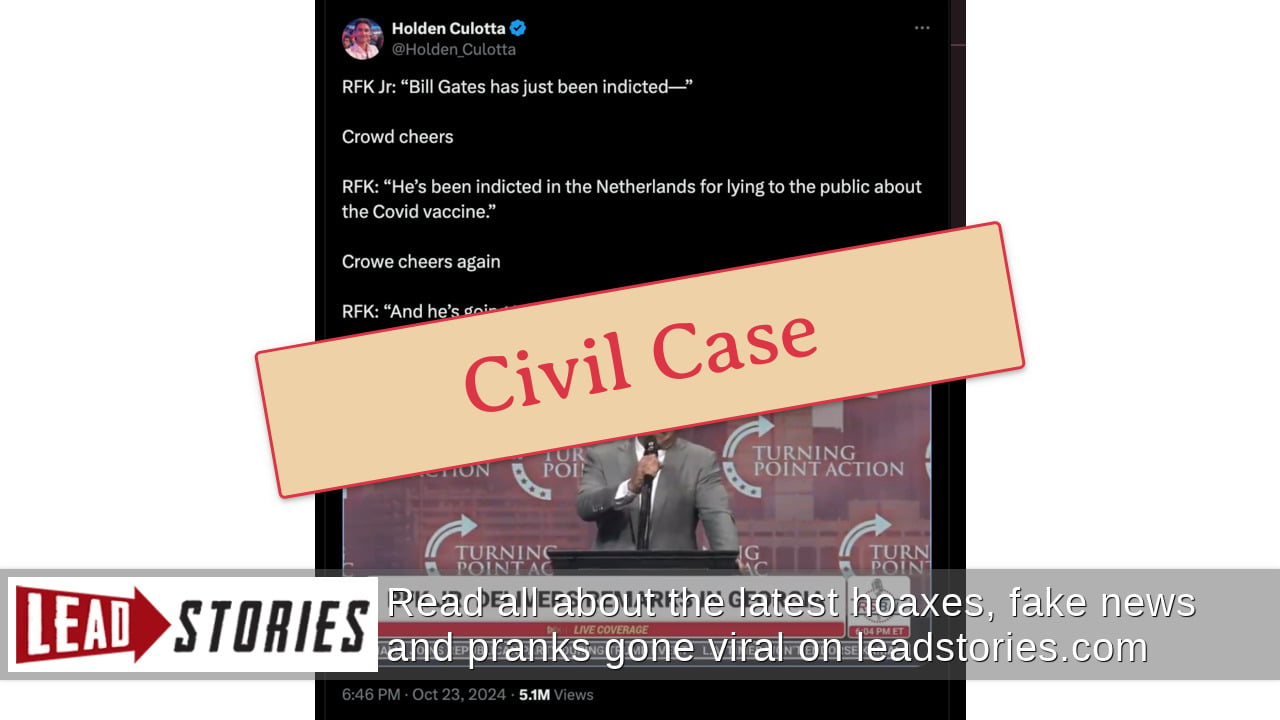Is Bill Gates facing legal troubles in the Netherlands? The answer, emphatically, is no. Despite a flurry of social media posts claiming an indictment, the reality is far more nuanced and highlights the dangers of misinformation in the digital age.
The recent surge of online chatter concerning Bill Gates and purported legal proceedings in the Netherlands has, unsurprisingly, turned out to be largely fabricated. The narrative, which gained traction across various social media platforms, painted a picture of the Microsoft co-founder facing serious charges and potential trial in the European nation. However, a deeper dive into the facts reveals a very different story, one that underscores the importance of fact-checking and media literacy in an era of rampant online disinformation. The initial catalyst for this misinformation appears to stem from a civil lawsuit filed against Gates by a group of Dutch citizens. This lawsuit, brought forward by individuals skeptical of COVID-19 and related initiatives, accused Gates of involvement in the "Great Reset" project and of playing a role in the COVID-19 pandemic. The allegations, widely dismissed as conspiracy theories, have fueled a misinformation campaign online, with some users falsely claiming that Gates had been indicted or was set to stand trial.
| Category | Details |
|---|---|
| Full Name | William Henry Gates III |
| Date of Birth | October 28, 1955 |
| Place of Birth | Seattle, Washington, U.S. |
| Education | Harvard University (dropped out) |
| Profession | Business Magnate, Investor, Philanthropist, Author |
| Known For | Co-founding Microsoft Corporation; Philanthropic work through the Bill & Melinda Gates Foundation. |
| Current Role | Co-chair of the Bill & Melinda Gates Foundation |
| Net Worth (approx.) | $129.5 Billion (as of May 2024) |
| Spouse | Melinda French Gates (divorced) |
| Children | Jennifer Katharine Gates, Rory John Gates, Phoebe Adele Gates |
| Philanthropic Focus | Global Health, Education, Climate Change, Poverty Reduction |
| Website | Bill & Melinda Gates Foundation |
The core of the misinformation campaign can be traced back to a civil case brought against Gates in the Netherlands. This lawsuit, filed by a group of individuals who identify as "corona skeptics," centers on allegations related to the COVID-19 pandemic and the "Great Reset" project, a concept often discussed in conspiratorial circles. According to reports in the Dutch newspaper De Telegraaf, the plaintiffs also named former Dutch Prime Minister Mark Rutte and other unnamed officials. Representing Gates in the legal proceedings was the Pels Rijcken law firm, a prominent litigation firm in the Netherlands. The firm argued that the Dutch court lacked jurisdiction over Gates, as he resides in the United States. This argument, the civil nature of the case, and the lack of credible evidence supporting the plaintiffs' claims are key to understanding the reality of the situation.
- Neal Katyal Impeachment Insights Supreme Court Expertise
- Lana Rhoades Age Birthday Facts You Didnt Know
A crucial distinction to make here is the difference between a civil lawsuit and a criminal indictment. In this instance, Gates was only named in a civil lawsuit. A civil case involves disputes between individuals or entities, and the outcome typically involves financial compensation or other non-criminal remedies. An indictment, on the other hand, is a formal accusation of a criminal offense, which could lead to a trial and, if found guilty, potential penalties such as fines or imprisonment. The claim of an "indictment" in the Netherlands, widely circulated on social media, is simply not true.
The spread of the false "indictment" narrative was facilitated by several factors. The speed and reach of social media platforms allowed the claim to gain rapid traction, especially among users already inclined to distrust mainstream media and embrace conspiracy theories. The lack of immediate and widespread reporting from reputable news outlets further amplified the false narrative, as it suggested a deliberate cover-up or conspiracy. This is a critical point because if something like this actually happened, it would have been covered in every major media outlet across the world.
The legal proceedings in the Netherlands are ongoing, but the nature of the case, the accusations involved, and the context in which they were made suggest a high probability of dismissal. The legal team representing Gates argued that the Dutch courts lacked jurisdiction because of his residency outside of the Netherlands. In addition, the core of the accusations is rooted in conspiracy theories that lack any verifiable evidence. It is unlikely this case will ever proceed to trial.
- Did El Chapo Pablo Escobar Know Each Other Unveiling The Truth
- Disney Dreamlight Valley How To Make Chocolate Waffles
The incident serves as a cautionary tale, highlighting the risks of consuming information without critical analysis. The initial claims, presented as fact, were quickly debunked by those who sought out the truth, but the damage was already done. The proliferation of false claims can erode trust in credible sources and can have severe implications. The focus of the civil suit, according to reports, targeted the role of Gates and others during the COVID-19 pandemic. The lawsuit was also directed at former Prime Minister Rutte, and other "members" of the Dutch government. It is important to note that the suit focuses on accusations and misinformation, and is not based on evidence of wrongdoing.
The spread of false claims about Bill Gates is not an isolated incident. The spread of misinformation is a constant and growing challenge in the digital age. Recent reports on the social media platform X showed a post with Robert F. Kennedy Jr., highlighting the importance of information verification. This situation highlights how quickly false information can spread and the potential impact it can have on public perception.
The incident also provides a case study on the challenges faced by global health leaders in the era of widespread misinformation. Public figures and organizations working in areas such as global health must actively combat the spread of false information and cultivate trust. This requires transparency, accuracy, and a commitment to addressing the sources of misinformation. The incident surrounding Bill Gates provides an important reminder of this responsibility.


